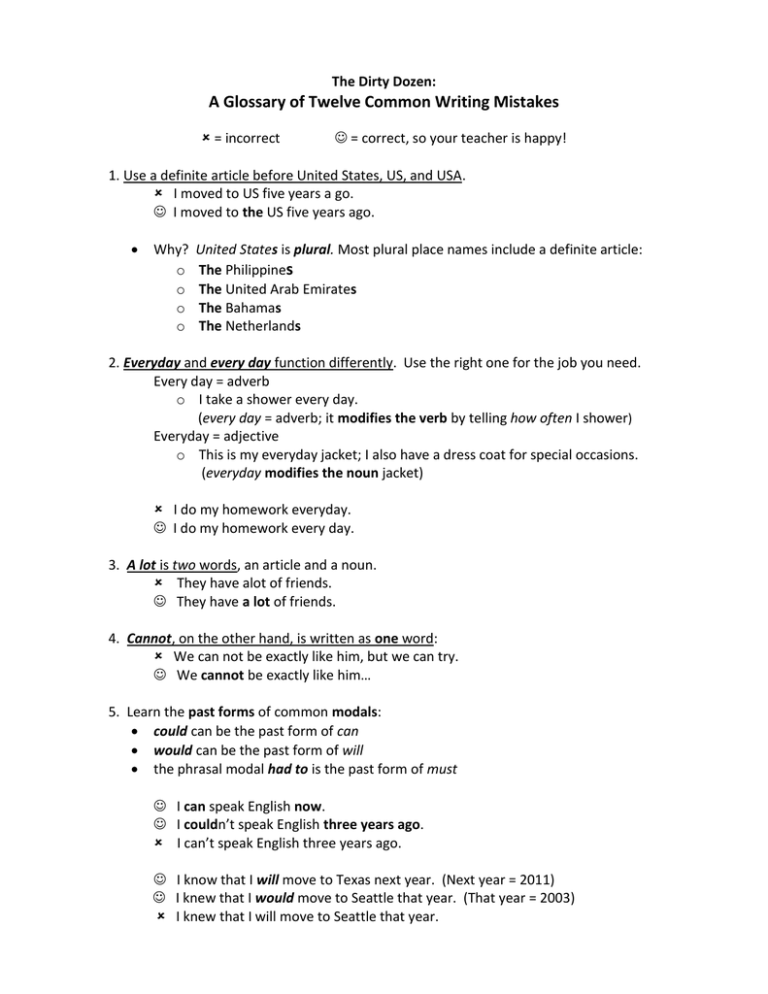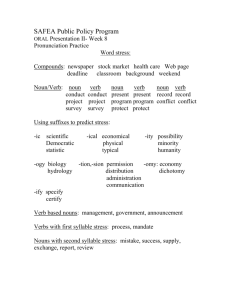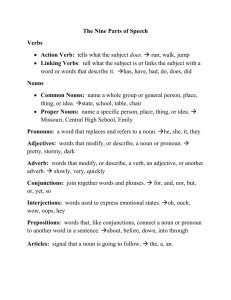A Glossary of Twelve Common Writing Mistakes
advertisement

The Dirty Dozen: A Glossary of Twelve Common Writing Mistakes = incorrect = correct, so your teacher is happy! 1. Use a definite article before United States, US, and USA. I moved to US five years a go. I moved to the US five years ago. Why? o o o o United States is plural. Most plural place names include a definite article: The Philippines The United Arab Emirates The Bahamas The Netherlands 2. Everyday and every day function differently. Use the right one for the job you need. Every day = adverb o I take a shower every day. (every day = adverb; it modifies the verb by telling how often I shower) Everyday = adjective o This is my everyday jacket; I also have a dress coat for special occasions. (everyday modifies the noun jacket) I do my homework everyday. I do my homework every day. 3. A lot is two words, an article and a noun. They have alot of friends. They have a lot of friends. 4. Cannot, on the other hand, is written as one word: We can not be exactly like him, but we can try. We cannot be exactly like him… 5. Learn the past forms of common modals: could can be the past form of can would can be the past form of will the phrasal modal had to is the past form of must I can speak English now. I couldn’t speak English three years ago. I can’t speak English three years ago. I know that I will move to Texas next year. (Next year = 2011) I knew that I would move to Seattle that year. (That year = 2003) I knew that I will move to Seattle that year. 6. Follow listen with the preposition to. I listen the radio in the car. I listen to the radio in the car. Compare: I hear you. (non-action verb that takes a direct object) I am listening to you. (action verb that does not take a direct object) 7. Advice is a noun; advise is a verb. I listened to her advise. She gave me good advice. 8. Advice, information, knowledge, and homework are all non-count nouns. Do not make them plural, and do not use an indefinite article with them. (Using some or a lot of with non-count nouns is okay.) She gave me an advice. She gave me some good advices. She gave me some good advice. That teacher gives her student a lot of useful information. 9. Use less to modify non-count nouns and few or fewer to modify count nouns. If we follow his advice, we will have less problems. If we follow his advice, we will have fewer problems. 10. After a preposition, use a gerund rather than an infinitive or the base form of a verb. A gerund is formed by adding –ing to the base form of a verb; it functions as a noun. Because it is a noun, it can be the object of a preposition. I always brush my teeth before to go to bed. I always brush my teeth before go to bed. I always brush my teeth before going to bed. 11. A clause that begins with a subordinating conjunction (because, when, although, if, etc.) cannot be a complete sentence. Because I studied. Because I studied, I got a good grade. I got a good grade because I studied. 12. Finally, never ever use a form of BE + the base form of verb as the verb in any sentence you write. That is not a possible combination in English! I am not go to work now. I am not going to work now. The report was write by my coworker. The report was written by my coworker. She is never give up until she gets what she wants. She never gives up… OR She doesn’t ever give up…








